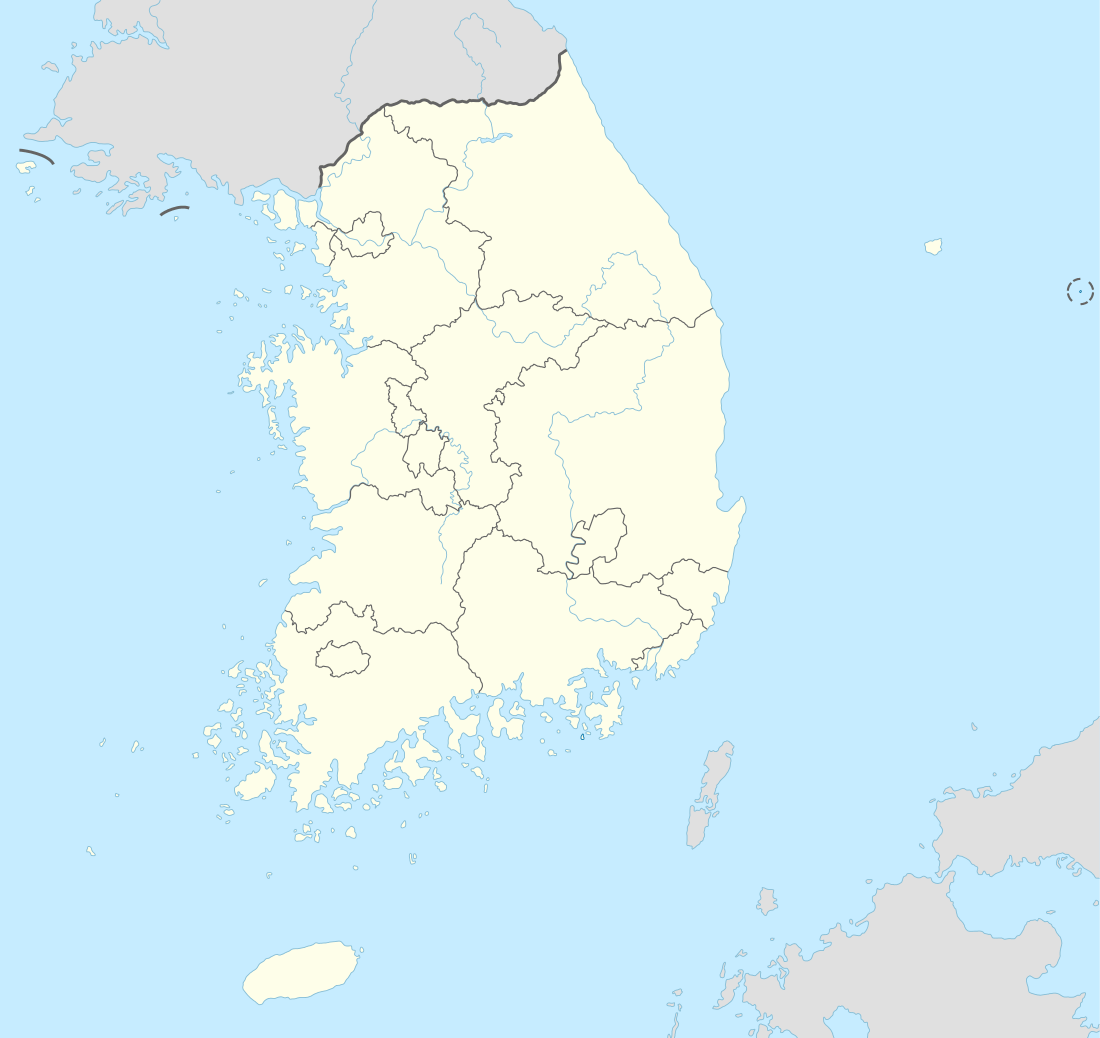KBO League
|
Current season, competition or edition: | |
 | |
| Sport | Baseball |
|---|---|
| Founded |
1982 1981 (KBO founded) |
| Founder | Korea Baseball Organization |
| No. of teams | 10 |
| Country | South Korea |
| Venue(s) | 9 |
| Most recent champion(s) | Kia Tigers (11th title) |
| Most titles | Kia Tigers (11 titles) |
| Qualification | Asia Series (2005–2013) |
| TV partner(s) | KBS, MBC, SBS, Sky Sports, SPOTV |
| Official website | koreabaseball.com |
The KBO League (Hangul: KBO 리그),[1][2] originally called the Korea Baseball Championship (Hangul: 한국야구선수권대회; Romanization: Hanguk Yagu Seonsukkwon Daehoe), is the highest level league of baseball in South Korea. The KBO League was founded with six franchises in 1982, and has expanded to ten franchises.[3] Nine of the ten franchises are named after the companies or business conglomerates which own them, while one sold their naming rights (Nexen Heroes).[4] The KBO League is the most popular sports league in South Korea.[5] Kia Tigers (formerly Haitai Tigers) are the most successful team, having won 11 out of the 36 championships.
History
The first game was played on March 27, 1982 between Samsung Lions and the MBC Chungyong (now the LG Twins) at Dongdaemun Baseball Stadium, Seoul. Then-president Chun Doo-hwan threw the first pitch.
The inaugural franchises were:
- Haitai Tigers, based in Gwangju
- Lotte Giants, based in Busan
- MBC Chungyong, based in Seoul
- OB Bears, based in Daejeon
- Sammi Superstars, based in Incheon
- Samsung Lions, based in Daegu
In 1985, the Sammi Superstars became known as the Cheongbo Pintos. The next year, 1986, saw some major changes, with the OB Bears moving from Daejeon to share the Seoul's Jamsil Baseball Stadium with MBC Chungyong in Seoul. A new franchise, the Binggrae Eagles, joined to replace vacancy of Daejeon by OB's moving and expanding the league to seven franchises. 1988 saw the Cheongbo Pintos change ownership again, becoming the Pacific Dolphins. In 1990, MBC Chungyong became the LG Twins and an eighth franchise was added, the Ssangbangwool Raiders who represented the Jeollabuk-do region.
There was little change in the 1990s except for a few major sponsors: in 1993 the Binggrae Eagles became the Hanwha Eagles, in 1995 the Pacific Dolphins became the Hyundai Unicorns and the OB Bears in 1999 became the Doosan Bears. Bigger changes were affected in 2000 when the Hyundai Unicorns moved from Incheon to Suwon, and a new franchise, the SK Wyverns took their place in Incheon. The Ssangbangwool Raiders became defunct. In 2001, the Haitai Tigers became the Kia Tigers.
In 2008, the Hyundai Unicorns franchise was disbanded, re-founded as the Woori Heroes and moved to Mok-dong in Seoul. Despite winning four championships, the franchise enjoyed little fan support after moving to Suwon. The team's naming rights were sold to Nexen Tire and the team was renamed Nexen Heroes.
Expansion resumed in the 2010s, with the addition of the NC Dinos, located in Changwon, which joined the league in 2013. It is the first team located in Changwon, the city having previously been the second home of the nearby Lotte Giants.
In 2015, the KT Wiz became the league's 10th franchise. They play their home games in Suwon, which had not had a team since the Hyundai Unicorns' disbandment.
The league has recently enjoyed a surge in popularity, with increased attendance and player salaries. Several KBO players have also successfully transitioned from the KBO to the Major Leagues, such as Ryu Hyun-Jin, Kang Jung-Ho or Kim Hyun-soo. This increase in popularity has been accompanied by the building of larger and more modern ballparks, such as Gwangju-Kia Champions Field (2014), Gocheok Sky Dome (2016) and Daegu Samsung Lions Park (2016).
Season structure
Starting with the 2015 season, each team plays 144 games in the regular season, increased from 128 due to the addition of the KT Wiz to the league. Each team plays every other team 16 times.[6]
KBO All-Star Game
In mid-July of every season, the best players participate in the KBO All-Star Game. The franchises participating are divided into two sets of teams: Dream All-Stars (Doosan, KT, Lotte, Samsung, and SK) and Nanum All-Stars (Kia, Hanwha, LG, NC and Nexen). The KBO All-star game does not determine home-field advantage in the KBO Korean Series.
Playoffs
The KBO League's season culminates in its championship series, known as the KBO Korean Series. Currently, the top five teams qualify for the post-season based on win/loss records. The lowest-qualifying teams face off in a step-ladder playoff system, where each winner then faces the next-highest team, culimnating in the Korean Series against the top-ranked team.
- KBO Wild Card Game: 5th place team vs. 4th place team.
- 4th place advances with one win, 5th place must win twice to advance.
- KBO Semi Playoffs: KBO Wild Card Game Winner vs. 3rd place team
- First to three games advances.
- KBO Playoffs: KBO Semi Playoffs Winner vs. 2nd place team
- First to three games advances (reduced from four games since 2009).
- KBO Korean Series: KBO Playoffs Winner vs. 1st place team
- First to four games wins championship.
Any playoff games ending in an official tie are replayed, thereby raising the possibility of a close series containing more than the scheduled five or seven games.
Rules
Traditionally, Korea Professional Baseball games have a maximum number of extra innings before a game is declared an official tie. The KBO abolished this limit for the 2008 season, however it was reinstated in 2009, with a 12-innings limit imposed during regular season, 15-innings limit for playoff games.[7] The league places a cap on the number of foreign players allowed on club rosters. The foreign player limit is set at three, increased from two players from 2014.
All teams use the designated hitter rule.
Teams
| Single league (1982–1998, 2001–present)[note 1] | |||||
|---|---|---|---|---|---|
| Team | City | Stadium | Capacity | Founded | Joined |
| Nanum All-Stars[note 2] | |||||
| Hanwha Eagles | Daejeon | Daejeon Hanbat Baseball Stadium | 13,000 | 1985 | 1986 |
| Kia Tigers | Gwangju | Gwangju-Kia Champions Field | 22,244 | 1982 | |
| LG Twins | Seoul | Jamsil Baseball Stadium | 25,553 | 1982 | |
| NC Dinos | Changwon | Masan Baseball Stadium | 11,000 | 2011 | 2013 |
| Nexen Heroes | Seoul | Gocheok Sky Dome | 16,813 | 2008 | |
| Dream All-Stars[note 3] | |||||
| Doosan Bears | Seoul | Jamsil Baseball Stadium | 25,553 | 1982 | |
| KT Wiz | Suwon | Suwon Baseball Stadium | 22,067 | 2013 | 2015 |
| Lotte Giants | Busan | Busan Sajik Baseball Stadium | 26,800 | 1946 | 1950 |
| Samsung Lions | Daegu | Daegu Samsung Lions Park | 24,000 | 1982 | |
| SK Wyverns | Incheon | Munhak Baseball Stadium | 26,000 | 2000 | |
| Defunct clubs | ||||
|---|---|---|---|---|
| Team | City | Stadium | Founded | Ceased Operations |
| Hyundai Unicorns | Suwon | Suwon Baseball Stadium | 1982 | 2008 |
| Ssangbangwool Raiders | Jeonju | Jeonju Baseball Stadium | 1991 | 1999 |
- Notes
Franchise locations
Locations are listed from north to south.
| City | 1982–1984 | 1985 | 1986–1989 | 1990–1993 | 1994–1998 | 1999 | 2000–2001 | 2002–2007 | 2008–2012 | 2013–2014 | 2015–present | |
|---|---|---|---|---|---|---|---|---|---|---|---|---|
| Seoul | MBC Chungyong, 1982–1989 | LG Twins, 1989–present | ||||||||||
| OB Bears, 1985–1998 | Doosan Bears, 1999–present | |||||||||||
| Nexen Heroes, 2008–present [note 1] | ||||||||||||
| Incheon | Hyundai Unicorns[note 2] | |||||||||||
| SK Wyverns, 2000–present | ||||||||||||
| Suwon | Hyundai Unicorns, 2000–2007 | |||||||||||
| KT Wiz, 2015–present | ||||||||||||
| Daejeon | OB Bears, 1982–1984 | |||||||||||
| Binggrae Eagles, 1986–1993 | Hanwha Eagles, 1993–present | |||||||||||
| Jeonju | Ssangbangwool Raiders, 1990–1999 | |||||||||||
| Daegu | Samsung Lions, 1982–present | |||||||||||
| Gwangju | Haitai Tigers, 1982–2001 | Kia Tigers, 2002–present | ||||||||||
| Changwon | NC Dinos, 2013–present | |||||||||||
| Busan | Lotte Giants, 1982–present | |||||||||||
- Notes
Ballparks
| Doosan Bears / LG Twins | Hanwha Eagles | Kia Tigers | KT Wiz | Lotte Giants |
|---|---|---|---|---|
| Jamsil Baseball Stadium | Hanwha Life Eagles Park | Gwangju-Kia Champions Field | Suwon kt wiz park | Busan Sajik Baseball Stadium |
| Capacity: 25,553 | Capacity: 13,000 | Capacity: 22,244 | Capacity: 22,067 | Capacity: 26,800 |
.jpg) | 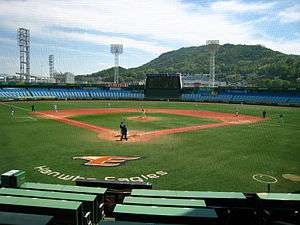 | 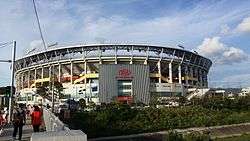 | .jpg) | |
| NC Dinos | Nexen Heroes | Samsung Lions | SK Wyverns | |
| Masan Baseball Stadium | Gocheok Sky Dome | Daegu Samsung Lions Park | Munhak Baseball Stadium | |
| Capacity: 11,000 | Capacity: 16,813 | Capacity: 24,000 | Capacity: 26,000 | |
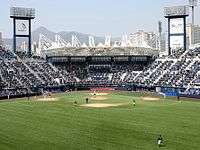 | 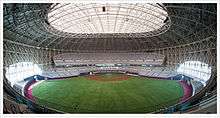 | 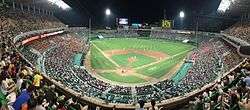 |
In addition to these ballparks, the Lotte Giants play some games at Ulsan Munsu Baseball Stadium, the Samsung Lions at Pohang Baseball Stadium and the Hanwha Eagles at Cheongju Baseball Stadium.
Champions
| Club | Champions | Runners-up | Winning seasons | Runners-up seasons |
|---|---|---|---|---|
| Kia Tigers | 1983, 1986, 1987, 1988, 1989, 1991, 1993, 1996, 1997, 2009, 2017 | — | ||
| Samsung Lions | 1985, 2002, 2005, 2006, 2011, 2012, 2013, 2014 | 1982, 1984, 1986, 1987, 1990, 1993, 2001, 2004, 2010, 2015 | ||
| Doosan Bears | 1982, 1995, 2001, 2015, 2016 | 2000, 2005, 2007, 2008, 2013, 2017 | ||
| Hyundai Unicorns (defunct) | 1998, 2000, 2003, 2004 | 1994, 1996 | ||
| SK Wyverns | 2007, 2008, 2010 | 2003, 2009, 2011, 2012 | ||
| LG Twins | 1990, 1994 | 1983, 1997, 1998, 2002 | ||
| Lotte Giants | 1984, 1992 | 1985, 1995, 1999 | ||
| Hanwha Eagles | 1999 | 1988, 1989, 1991, 1992, 2006 | ||
| Nexen Heroes | — | 2014 | ||
| NC Dinos | — | 2016 | ||
| KT Wiz | — | — |
Postseasons
- Legend
- 1st – Champions
- 2nd – Runners-up
- PO – Playoff loser
- SPO – Semi-playoff loser
- WC – Wild card game loser
- - – Did not qualify
- × – Not held
- – Did not participate
| Teams | 1982 | 1983 | 1984 | 1986 | 1987 | 1988 | 1989 | 1990 | 1991 | 1992 | 1993 | 1994 | 1995 | 1996 | 1997 | 1998 | 1999 | 2000 |
|---|---|---|---|---|---|---|---|---|---|---|---|---|---|---|---|---|---|---|
| Doosan | 1st | – | – | PO | PO | – | – | – | – | – | SPO | – | 1st | – | – | SPO | PO | 2nd |
| Hanwha | – | – | 2nd | 2nd | SPO | 2nd | 2nd | – | PO | – | SPO | – | – | 1st | – | |||
| Hyundai | – | – | – | – | – | – | PO | – | – | – | – | 2nd | – | 2nd | – | 1st | – | 1st |
| Kia | – | 1st | – | 1st | 1st | 1st | 1st | PO | 1st | PO | 1st | SPO | – | 1st | 1st | – | – | – |
| KT | ||||||||||||||||||
| LG | – | 2nd | – | – | – | – | – | 1st | – | – | PO | 1st | PO | – | 2nd | 2nd | – | PO |
| Lotte | – | – | 1st | – | – | – | – | – | SPO | 1st | – | – | 2nd | – | – | – | 2nd | SPO |
| NC | ||||||||||||||||||
| Nexen | ||||||||||||||||||
| Samsung | 2nd | – | 2nd | 2nd | 2nd | PO | SPO | 2nd | PO | SPO | 2nd | – | – | – | PO | PO | PO | PO |
| SK | – | |||||||||||||||||
| Ssangbangwool | – | – | – | – | – | PO | SPO | – | – | |||||||||
| Number | 2 | 2 | 2 | 3 | 3 | 3 | 4 | 4 | 4 | 4 | 4 | 4 | 3 | 4 | 4 | 4 | 4 | 5 |
| Teams | 2001 | 2002 | 2003 | 2004 | 2005 | 2006 | 2007 | 2008 | 2009 | 2010 | 2011 | 2012 | 2013 | 2014 | 2015 | 2016 | 2017 | 2018 | Total |
|---|---|---|---|---|---|---|---|---|---|---|---|---|---|---|---|---|---|---|---|
| Doosan | 1st | – | – | PO | 2nd | – | 2nd | 2nd | PO | PO | – | SPO | 2nd | – | 1st | 1st | 2nd | q | 21 |
| Hanwha | SPO | – | – | – | PO | 2nd | PO | – | – | – | – | – | – | – | – | – | – | q | 13 |
| Hyundai | PO | SPO | 1st | 1st | – | PO | – | 10 | |||||||||||
| Kia | – | PO | PO | SPO | – | SPO | – | – | 1st | – | SPO | – | – | – | – | WC | 1st | q | 21 |
| KT | – | – | – | – | 0 | ||||||||||||||
| LG | – | 2nd | – | – | – | – | – | – | – | – | – | – | PO | PO | – | PO | – | – | 12 |
| Lotte | – | – | – | – | – | – | – | SPO | SPO | SPO | PO | PO | – | – | – | – | SPO | – | 12 |
| NC | – | SPO | PO | 2nd | PO | – | 4 | ||||||||||||
| Nexen | – | – | – | – | – | SPO | 2nd | SPO | SPO | – | q | 5 | |||||||
| Samsung | 2nd | 1st | SPO | 2nd | 1st | 1st | SPO | PO | – | 2nd | 1st | 1st | 1st | 1st | 2nd | – | – | – | 28 |
| SK | – | – | 2nd | – | SPO | – | 1st | 1st | 2nd | 1st | 2nd | 2nd | – | – | WC | – | WC | q | 11 |
| Ssangbangwool | 2 | ||||||||||||||||||
| Number | 4 | 4 | 4 | 4 | 4 | 4 | 4 | 4 | 4 | 4 | 4 | 4 | 4 | 4 | 5 | 5 | 5 | 5 | 135 |
Awards
- See footnote[8] and Baseball awards#South Korea
- KBO League MVP Award[9]
- KBO League Rookie of the Year Award[10]
- KBO League Golden Glove Award[11]
- KBO League Korean Series MVP Award[12]
- KBO League All-Star Game MVP[13]
Year-end regional tournament
| Year | Tournament | Participants | Round | Position | W | L | RS | RA |
|---|---|---|---|---|---|---|---|---|
| 2005 Asia Series | Samsung Lions | Final | 2 | 2 | 17 | 17 | ||
| 2006 Asia Series | Samsung Lions | Group Stage | 1 | 2 | 16 | 11 | ||
| 2007 Asia Series | SK Wyverns | Final | 3 | 1 | 37 | 10 | ||
| 2008 Asia Series | SK Wyverns | Group Stage | 2 | 1 | 23 | 13 | ||
| KBO-NPB Club Championship 2009 | Kia Tigers | 0 | 1 | 4 | 9 | |||
| KBO-NPB Club Championship 2010 | SK Wyverns | 0 | 1 | 0 | 3 | |||
| CPBL-KBO Club Championship 2010 | 1 | 1 | 7 | 5 | ||||
| 2011 Asia Series | Samsung Lions | Final | 3 | 1 | 21 | 17 | ||
| 2012 Asia Series | Samsung Lions | Group Stage | 1 | 1 | 9 | 3 | ||
| Lotte Giants | Group Stage | 4th | 1 | 1 | 6 | 6 | ||
| 2013 Asia Series | Samsung Lions | Semifinals | 4th | 2 | 1 | 15 | 15 | |
| Total | 16 | 13 | 155 | 109 |

See also
References
- ↑ "The Korea Baseball Championship is the annual pennant race of first-tier professional baseball league in South Korea." Confirmed by Moon Jung-kyun, Public Relations Manager of Korea Baseball Organization. For further information, refer to the talk page of the Korean version article.
- ↑ For the official name of the league, refer to following page: http://baseballinkorea.com/2015/03/01/kbo-brand-identity
- ↑ http://english.chosun.com/site/data/html_dir/2010/04/15/2010041500309.html
- ↑ http://www.koreatimes.co.kr/www/news/opinon/2010/05/266_41922.html
- ↑ [2017 결산] 프로야구, 역대 최다 840만 관중..국민스포츠 공고 (in Korean). star.mt.co.kr. December 21, 2017. Retrieved February 12, 2017.
- ↑ Korea Baseball Organization (2015). 2015 달라지는 점 Archived 2015-04-05 at the Wayback Machine. (Korean). Accessed on April 14, 2015.
- ↑ Kim Jae-Won (2009-01-13). KBO Abolishes Endless Overtime Rule. The Korea Times. Accessed on 2009-06-11.
- ↑ Category:Korea Baseball Organization Awards. Baseball-Reference.com (Sports Reference LLC). Retrieved 2010-07-02.
- ↑ KBO Most Valuable Player Award. Baseball-Reference.com (Sports Reference LLC). Retrieved 2010-07-02. See also: Chinese Professional Baseball League MVP of the Year Award and Nippon Professional Baseball Most Valuable Player Award.
- ↑ KBO Rookie of the Year. Baseball-Reference.com (Sports Reference LLC). Retrieved 2010-07-02. See also: Chinese Professional Baseball League Rookie of the Year Award and Nippon Professional Baseball Rookie of the Year Award.
- ↑ KBO Gold Gloves. Baseball-Reference.com (Sports Reference LLC). Retrieved 2010-07-02. See also: Nippon Professional Baseball Mitsui Golden Glove Award and Major League Baseball Gold Glove Award.
- ↑ Korean Series Most Valuable Player Award. Baseball-Reference.com (Sports Reference LLC). Retrieved 2010-07-02. See also: Major League Baseball World Series MVP Award.
- ↑ For the KBO League All-Star Game MVP, go to KBO Gold Gloves, scroll to the bottom, and click on All-Star Game MVP. Baseball-Reference.com (Sports Reference LLC). Retrieved 2016-10-13.
External links
| Wikimedia Commons has media related to KBO League. |
